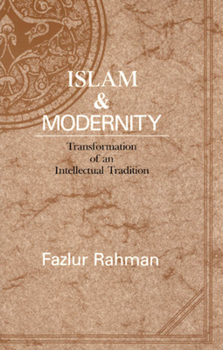Islam and Modernity: Transformation of an Intellectual Tradition Volume 15
Select Format
Select Condition 
Book Overview
"As Professor Fazlur Rahman shows in the latest of a series of important contributions to Islamic intellectual history, the characteristic problems of the Muslim modernists--the adaptation to the... This description may be from another edition of this product.
Format:Paperback
Language:English
ISBN:0226702847
ISBN13:9780226702841
Release Date:May 1984
Publisher:University of Chicago Press
Length:182 Pages
Weight:0.50 lbs.
Dimensions:0.5" x 5.6" x 8.4"
Customer Reviews
5 ratings
What might have been
Published by Thriftbooks.com User , 15 years ago
I found Fazlur Rahman's "Islam & Modernity" a very helpful and readable survey on the prospects for educational reform in the muslim world. Rahman's approach seemed to be geographically and politically comprehensive yet not at all stodgy or in the least way overwhelming. I find myself mourning the fact that he died in 1988 at the young age of 68 and wondering what further gifts he might have provided to the University of Chicago in particular and the West in general had he been blessed with greater longevity.
A truly landmark contribution
Published by Thriftbooks.com User , 16 years ago
This book was inspirational and a real breakthrough in my understanding and relationship with my faith. It was the first occasion that an orthodox scholar refused to close the gates of inquiry, and maintains that Islam mandate these gates remain open allowing in questions and solutions sensitive to particular societies; it claims that the Quran requires particularity and not immanence in realising what is a Muslim way of life and refuses to yield to the sheer weight of orthodoxy. Fazlur Rahman is brave and determined not to let the ideologues, the obedience automatons from hijacking the wonderful Message. This is despite the fact that one may critique his theory in Chapter One (also included in Kauzmann's Liberal Islam anthology); his other book 'Islam' is also an inspiring read.
Wonderfully clear writing
Published by Thriftbooks.com User , 18 years ago
Here's a sample of the book's prose. After describing the challenge to some traditional Islamic tenets posed by Izz al-Din Ibn Abd al-Salam al-Sulami, and others, Fazlur Rahman writes "But orthodoxy had developed an amazing shock-absorbing capacity: all these thinkers were held in high esteem by orthodox circles as great representatives of Islam, but such statements of theirs as had radical import were invariably dismissed as 'isolated' (shadhdh) or idiosyncratic and were quietly buried. It took real rebels like Ibn Taymiya to make any perceptible dent in this stieel wall of ijma (consensus.)" I love it. We get a sense of the orthodoxy-preserving process he's describing in visual and tactile terms, and we're drawn in to the "buried" views that it is some part of his goal to resurrect here.
a scholars vision for his religion
Published by Thriftbooks.com User , 22 years ago
This small work is essential reading for understanding Islam. The previous review suffices, but I just wanted to add a note about the work's content. During my first reading, I thought that the work was overly bogged down with a discussion of education and its development throughout Pakistan, Turkey, etc. However, upon a second reading, I found this to be the most profound and impactful section of the work, as this is the locus of the true reform of Islam and its true modernization will occur. Thus, this work is partly a late scholar's dream for the future of his religion. Though at the same time, it is deeply grounded in history and its realities.
well-researched, insightful - a significant contribution
Published by Thriftbooks.com User , 23 years ago
Fazlur Rahman is truly one of the greatest scholars of Islamic History, in addition to being very controversial. In this book, Fazlur Rahman explores the transformation of the Islamic intellectual tradition, ranging from philosophy and ethics, to jurisprudence. He brilliantly exposes and analizes the tension that exists in the interpretation(s) of the Qur'an. Rahman ambitiously demonstrates that for Islam and the Qur'an to be what Muslims actually claim them to be, comprehensive in scope and pertinent for every age and society, then Muslims must re-evaluate the Qur'an in positive ways, and in light of modernity and its challenges. In a similar vein, Rahman argues that for Islam to truly demonstrate its principles of social equality and justice, Islamic scholars must re-examine their methodology and hermeneutics. Amongst several other things, Rahman critiques the repetitive rhetoric and anti-philosophical trends that the Islamic intellectual communities faced during Islamic Medieval times. This work is a significant contribution to understanding the Muslim world today. It is a genuine search for broadening the scope of Islam by extrapolating upon its inherent egalitarian principles. It is also a beautiful re-evaluation of the Qur'an, by having studied it throught the context of its revelation. I recommend this book for Muslims as well as Non-Muslims interested in the study of Islam and Islamic Intellectual History.




